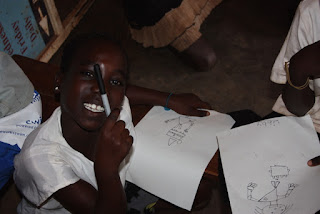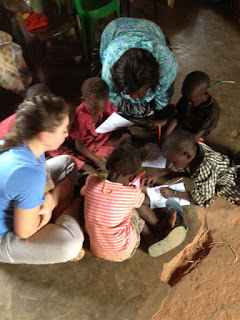Just over a year ago, as John Njendahayo
and I were driving back from visiting the Missing Link Microfinance project
that had been set up in conjunction with CRED Foundation, we chatted about
possible ways to develop the programme further. One idea that John came up with
was to run a ‘Dragons Den’ style event that would be open to any of the
beneficiaries of the project. This week that dream came to fruition.
There were a few stages to the event,
starting with John introducing the concept to the local project beneficiaries
and encouraging them to think / dream / vision, call it what you will, and take
the opportunity to think outside the box and come up with a proposal. The size
of the pot of money wasn’t announced, so as not to hinder the dreaming, but there
were three criteria that the participants had to fulfill with their ideas: to
be innovative, to be of benefit to the community, and they had to be willing to
do a presentation about it to the ‘dragons’.
The next stage of the process was the
initial 5 minute pitch from participants (14 took part), and it was wonderful
to see what a wide range of ideas there were; many of them really were
‘thinking outside the box’.
 |
| Initial pitch: photo by Annie Sanderson |
 |
| initial pitch: photo by Annie Sanderson |
The 14 were whittled down to a shortlist of
6 by the team of ‘dragons’ with local contextual insights from John and his
dad. This was crucial as there is only so much you can pick up from a 5 minute
presentation, especially when those doing the presentations have never done
anything like that before, and so shyness and nerves were part of the process
for some. But input from John and his dad ensured that the projects chosen were
all ones that fulfilled the criteria and also had the required potential to go
through to the final.
The following day we met with the
shortlisted candidates and had some time chatting about how they could refine
their presentation, what extra information to include, and just a chance to
think the plans through more so they could have it all clearer in their minds
when it came to making the final presentation. They also all attended the
workshops in the afternoon, including those on business start up and
book-keeping, both of which gave some useful extra input into their
presentations.
 |
| One on one sessions: photo by Annie Sanderson |
 |
| One on one sessions: photo by Annie Sanderson |
 |
| One on one(ish) sessions: photo by Annie Sanderson |
And then the day of the Dragon’s Den final
dawned!!!
The event was opened with a prayer, the
participants were reminded about the criteria and what we were looking for in
their presentations, and then we sat back and listened, took notes, and
delighted in seeing 6 individuals rising to the opportunity of having the
chance to dream bigger than the reality that life currently gives them.
The presentations were varied, some more
polished than others, but in all of them we could see how much the plans and
thought processes had developed since their initial pitches two days earlier,
and it was heartening to see how they had taken the skills learnt in the
workshops and put them straight into practice with regard to working out
budgets etc
Once all 6 participants had done their
presentations we, the dragons, snuck off to discuss and decide on the winner.
Making that decision was incredibly hard, as there were so many good ideas, and
we knew that the money to be given as the prize was not an insignificant
amount. So it had to be sure to go to the project that fulfilled the criteria,
and that also was being put forwards by someone who had thought it all through
enough to be able to put it into action. Like last time the decision was made
not just by the team, but with input from John who brought local knowledge and
insight which were so crucially needed.
Finally we concluded that we actually had
enough money for two winners – and even better the winning projects were headed
up by a man and by a woman. Feedback was given to all the participants, and
encouragement was given for them to meet up together every couple of months to
share the wealth of knowledge that they all have between them. And then the two winners were announced, and presented with a certificate each (thanks to the wonderful calligrapher Fiona Mitchell) and their money.
 |
| Fiona, certificate writer extraordinaire: photo by Annie Sanderson |
 |
| Cosmos and Rose - the winners! photo by Annie Sanderson |
The looks of delight and astonishment on
the faces of the two winners were beautiful. Such humility, such grace, as well
as such happiness at the realization that the dreams could actually become a
reality and not just remain always slightly out of reach. Yes there was a tinge
of sadness that not all the participants could win, but that’s the reality of
competitions, and I rest in the knowledge that this was a competition designed
not by westerners but by Ugandans, seeking to find new ways to encourage
entrepreneurship and self-belief within rural Uganda.
And so to the winners:
Rose is looking to set up a food drying business using a solar dryer, so
that she can dry food when there is a surplus of it, and make it available
during the off-seasons. Neighbours will be able to use the drier themselves, or
sell their surplus to Rose, and in so doing either be able to make some money,
or make some nutritious food for themselves. It also reduces food wastage, and
increases the range of foods available around the year – two more positives for
the community and environment generally
 |
| Rose: photo by Annie Sanderson |
Cosmas is looking to develop his small bee-keeping industry. He currently
has 15 hives and sells the honey locally by going door-to-door with a bucket of
the honey. Neighbours have already noticed that they have had better coffee
crops etc due to the presence of the bees pollinating the plants, and Cosmas
would like to increase his business. He will be training up others to help him,
and will be using local people to help with transport and selling the honey at
markets once he has progressed to packing the honey in small jars etc. So there
will be employment, training, and the presence of even more bees will help
farmers over a wider area.
 |
| Cosmas: photo by Annie Sanderson |
Both really worthy winners, and I am
looking forward to having the opportunity to meet with them later in the year
to see how they are progressing.
The event was definitely a big success. The
positive impact on all the participants, and the wider community, of having
this competition was very visible from watching the support and interaction
throughout, as well as witnessing the development of business-style thinking
that was taking place. John’s objectives for holding the event were certainly
fulfilled, and there are already thoughts on how we can learn from this pilot
and take it forward in some fashion.
To end: a brief mention of the other 4
finalists and their projects, just to show the diversity; and also a comment
that if any reader would be interested in taking part in a future dragons den
event, then please let me know as I’m already looking for the next team.
So, in alphabetical order, the other 4
finalists were:
Betty – making pig food from discarded
maize cobs
Godfrey – fish farming in man-made pools
rather than natural ponds
Gonzagas – expanding his oyster mushroom
business
Sylvia – starting a small tailoring and crafts
training school
 |
| Dragons and entrpreneurs: photo by Annie Sanderson |




























